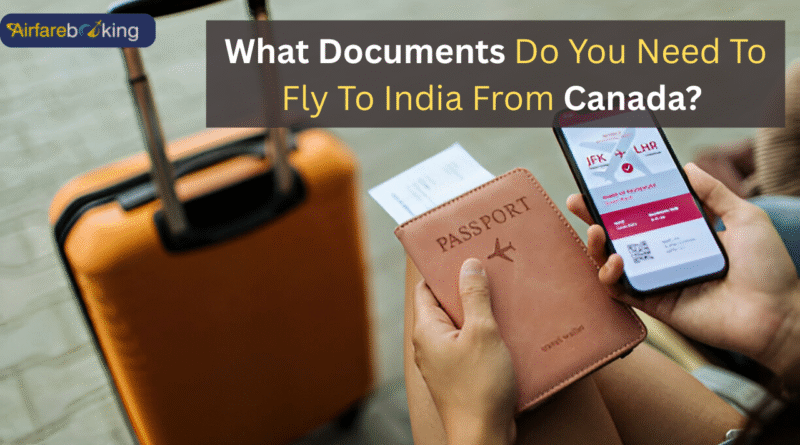What Documents Do You Need To Fly To India From Canada?
The documents required to travel to India from Canada are a valid Canadian passport, an Indian eVisa, a Return ticket, vaccination certificates, travel insurance, proof of sufficient funds, and a SIM card.
Planning a trip to India from Canada? Whether it’s your first visit or your fifth, having the right documents in hand is crucial. From valid passports and Indian visas to optional (but smart) add-ons like travel insurance, this guide walks you through every document you need to travel confidently from Canada to India in 2025. However, you can grab the best airfare deals at Airfarebooking. This flight booking platform is great at offering the best and affordable airfare deals.
1. Valid Canadian Passport
- Your passport is your most important travel document.
- It must be valid for at least 6 months from the date you arrive in India.
- Ensure it has at least two blank pages for immigration stamps.
- If your passport is close to expiry, renew it before booking any Toronto to Delhi flights.
- Processing times vary by province, but in general, Service Canada offers standard, express, and urgent options.
2. Indian Visa for Canadian Citizens (eVisa or Sticker Visa)
Yes, Canadians must have a visa to enter India. The easiest and fastest way is through India’s eVisa system.
Indian eVisa Options:
- Tourist Visa (30 days, 1 year, or 5 years)
- Business Visa
- Medical Visa
Required Documents:
- Scanned passport copy (JPEG/PDF format)
- Recent digital photo
- Flight itinerary (optional but helpful)
Processing Time:
- 3–5 business days (but apply at least a week before travel).
- Print a hard copy of your visa AND save it on your phone/tablet. Immigration officers often ask for a printed version.
3. Return or Onward Ticket
- India’s immigration law requires proof that you’re not overstaying.
- Have a return ticket to Canada or an onward ticket to another country.
- Airlines and immigration officers may ask for: a printed e-ticket, an Email confirmation on your phone, and Proof of accommodation (optional, but good to have).
- Booking a flexible or refundable ticket gives you peace of mind.
4. Vaccination Certificates (If Applicable)
However, some health precautions still apply:
- COVID-19 vaccines are not mandatory for Canadians traveling to India in 2025.
- Yellow Fever vaccine: Mandatory if you’re passing through parts of Africa or South America within 6 days before arrival in India.
Recommended (but not required):
- Hepatitis A & B
- Typhoid
- Tetanus
- Routine childhood vaccinations
5. Travel Insurance
While not required by law, travel insurance is a smart must-have.
What to Look For:
- Emergency medical coverage (minimum CAD 100,000).
- Trip delay/cancellation protection.
- Lost baggage coverage.
- COVID-19 coverage (still offered by most insurers).
Top Canadian Providers:
- Manulife Travel Insurance
- Blue Cross
- World Nomads
- TuGo
6. Proof of Sufficient Funds
Not always asked, but Indian immigration can request financial proof.
What Works:
- Recent bank statements.
- Credit card limits or balance.
- Travel money cards or prepaid forex cards.
- INR cash (maximum ₹25,000 allowed on arrival).
- Convert some CAD to INR before departure or use an Indian ATM with a no-foreign-fee card.
7. SIM Card or Roaming Plan
While not a travel document, communication access is essential.
Options for Canadians:
- Buy a local Indian SIM (Airtel, Jio, Vi) after arrival.
- Activate roaming with Bell, Rogers, or Telus.
- Use an international eSIM (like Airalo or Holafly).
- Bring a passport-sized photo if buying a SIM in India. It’s required for KYC (Know Your Customer).
8. Canada-to-India Travel Document Checklist
Here’s a quick checklist to keep handy:
| Requirement | Status |
| Valid Canadian passport (6+ months) | yes |
| Indian eVisa approved (printed + digital copy) | yes |
| Return or onward flight ticket | yes |
| Travel insurance (recommended) | yes |
| Vaccination certificates (if transiting) | yes |
| Proof of funds (bank statement/credit card) | yes |
| SIM card plan or Indian eSIM (optional) | yes |
To Summarize
Going on a trip to India in the year 2025 is fun, and the administration should not be a means to spoil the trip. Ensure that your passport is updated, your visa is accepted, you have your homecoming ticket, and a travel insurance policy. Apply the above checklist, and the Canadian and Indian airports will be no bother to you.
FAQs
Q1: Do Canadian citizens need a visa to travel to India?
Yes, all Canadian passport holders must apply for a visa before entering India. The eVisa is the most popular option.
Q2: Can I get an Indian visa on arrival?
No. India does not offer visas on arrival for Canadians. Apply online before your trip.
Q3: How long can I stay in India with an eVisa?
It depends on the visa type:
- 30-day: Two entries allowed
- 1-year/5-year: Multiple entries allowed, stay up to 90 days per visit
Q4: Is travel insurance mandatory to enter India?
No, but it’s highly recommended especially for medical coverage and emergencies.
